|
|
|
Sort Order |
|
|
|
Items / Page
|
|
|
|
|
|
|
| Srl | Item |
| 1 |
ID:
102772
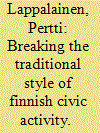

|
|
|
| 2 |
ID:
067690
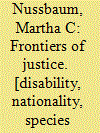

|
|
|
|
|
| Publication |
Cambridge, Harvard University Press, 2006.
|
| Description |
xv, 487p.
|
| Series |
The Tanner lectures on human values
|
| Standard Number |
0674019172
|
|
|
|
|
|
|
|
|
|
|
|
Copies: C:1/I:0,R:0,Q:0
Circulation
| Accession# | Call# | Current Location | Status | Policy | Location |
| 050656 | 320.011/NUS 050656 | Main | On Shelf | General | |
|
|
|
|
| 3 |
ID:
170002
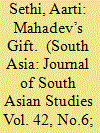

|
|
|
|
|
| Summary/Abstract |
In October 2016, protests erupted across southern India opposing a Supreme Court judgement banning an annual agricultural festival featuring jousts between men and bulls. The Court ruled the contests as infringing animal rights. Rural constituencies rallied behind the festival as a customary practice and symbol of agrarian culture. This essay suggests that the conflict between the two constituencies turns on whether animals are legal subjects or social persons. I analyse this festival-complex in Maharashtra to show that the ritual imagines animals not as rights-bearing species, but as members of the agricultural community. The rite does not disavow violence, rather it embeds its symbolisation within familial and productive relations between people and bullocks.
|
|
|
|
|
|
|
|
|
|
|
|
|
|
|
|
| 4 |
ID:
124196
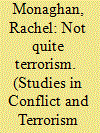

|
|
|
|
|
| Publication |
2013.
|
| Summary/Abstract |
Political violence undertaken in the name of animal rights has been ongoing for some 35 years in the United Kingdom and yet such activity is commonly termed extremism, not terrorism. Existing counterterrorism measures have not been utilized by the state against individuals and groups engaged in such violence. This article explores the criminal justice response to the various types of political violence, which have been claimed by groups like the Animal Liberation Front (ALF), the Animal Rights Militia, the Justice Department, and the Provisional ALF. Moreover, the article argues that terrorist laws do not have to be used to effectively tackle single-issue terrorism such as animal rights extremism where activists employ tactics more commonly associated with a terrorist campaign.
|
|
|
|
|
|
|
|
|
|
|
|
|
|
|
|
| 5 |
ID:
169137
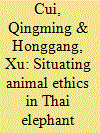

|
|
|
|
|
| Summary/Abstract |
Following ethical contextualism, this article situates different animal ethical principles, from anthropocentrism to non‐anthropocentrism and relational caring ethics, in Thai social contexts in order to examine whether these principles can lead to a sustainable ethical practice in elephant conservation. The results show that, as non‐anthropocentrism, animal rights ethics are impractical in Thailand because of temporal, spatial, economic and social constraints. As weak anthropocentrism, animal welfare ethics endorse the tourism industry to commercialise the encounter value of elephants by developing elephant camps. Along with animal welfare, relational ecofeminism justifies the emerging model of elephant sanctuaries. Both camp and sanctuary models create a work‐for‐care cycle, in which elephants work to generate economic gains, some of which are in turn used to care for elephants. However, because of evolving social situations, such as potential market competition and poaching of wild elephants, the morality of the work‐for‐care cycle is weak and can be challenged. Nevertheless, sanctuaries offer a direction for a local solution because of their potentially responsible business model. In conclusion, there is not a single set of ethics that can solve all problems and be sustainable in all contexts.
|
|
|
|
|
|
|
|
|
|
|
|
|
|
|
|
|
|
|
|
|